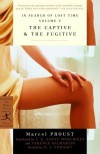Currently reading
Quand un roi perd la France (Les rois maudits, #7)
Antigones
The Captive & The Fugitive
 Haute couture is already something of a world apart, alien and perhaps not a little dystopic, so it's not a huge stretch to go ahead and create a whole futuristic dystopia for your designers to work and scheme in. (The converse is not necessarily true, and indeed I never got any particular idea exactly how this bizarro future was supposed to have come about.)
Haute couture is already something of a world apart, alien and perhaps not a little dystopic, so it's not a huge stretch to go ahead and create a whole futuristic dystopia for your designers to work and scheme in. (The converse is not necessarily true, and indeed I never got any particular idea exactly how this bizarro future was supposed to have come about.)The portions of the narrative in the present are all set in italics, which is incredibly annoying to read for stretches of even a couple of pages (this book has short, choppy chapters, some of which seem to be barely twice as long as their rambling, gimmicky titles) at a time, especially since these sections don't advance the action much throughout the entire middle of the book, saving everything for the double climax at the end.
The part of the book I enjoyed most was actually buried in the middle, as Tane in the flashbacks gradually comes to a revised understanding of his even earlier childhood, brainwashed into devoting all his energies into growing the corn that feeds the decadent cities. Somehow, the detail that the mass-produced shirts impregnated with hormones and drugs to make the workers sexless and pliant were also ill-fitting and uncomfortable is telling.





